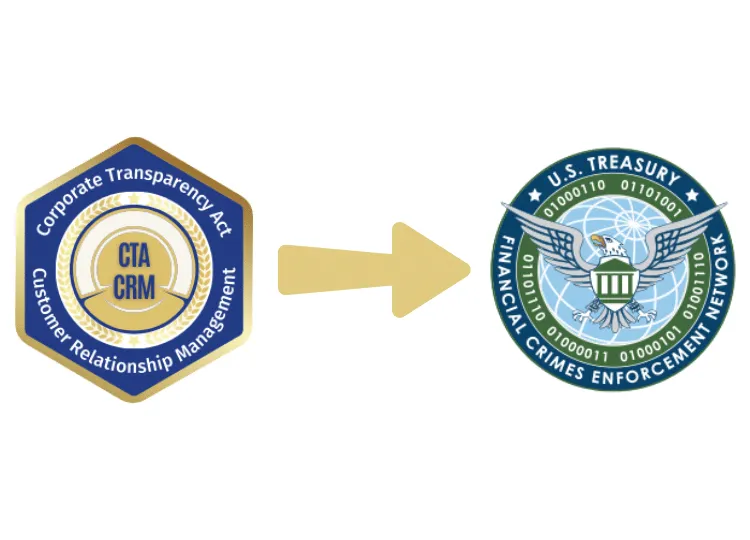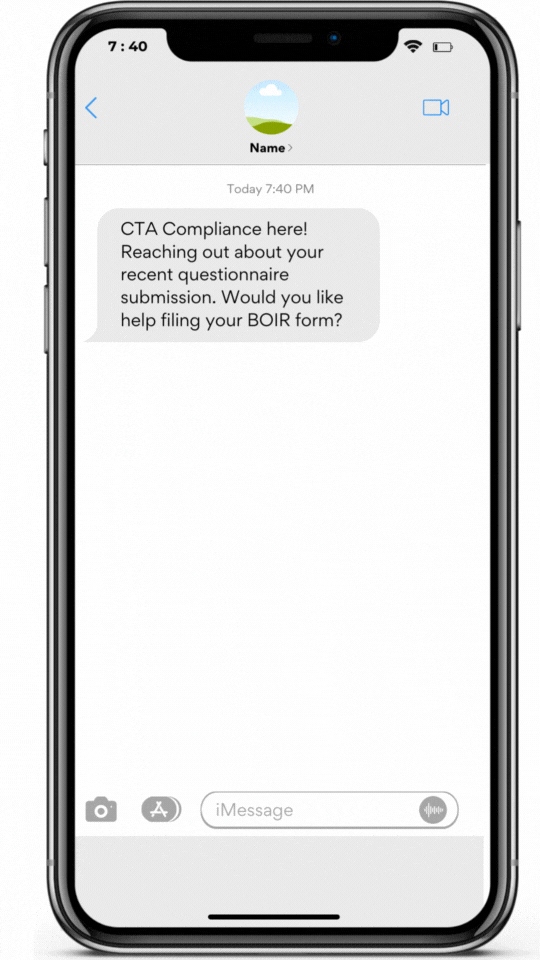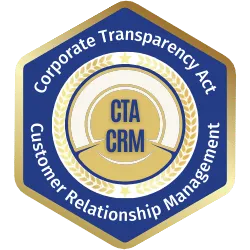Welcome to CTA CRM

We are your all-in-one Customer Relationship Management (CRM) solution for tracking and nurturing your leads, as well as filing your clients Beneficial Ownership Information Reports (BOIR) under the Corporate Transparency Act (CTA) required by the Financial Crimes Enforcement Network (FinCEN).


About Us
Our mission is to help you organize, advertise and streamline your lead generation process, as well as onboard and automate the Beneficial Owner Information Report (BOIR) filing process with the Secretary of the Treasury's Financial Crimes Network (FinCEN) as required by the Corporate Transparency Act (CTA) on behalf of your clients, giving you confidence that you have the best tools for your business and your clients.
Why Choose Us
Prospecting Tool
It is a long established fact that a reader will be distracted by the readable content of a page when looking at its layout.
Automatic Payments
It is a long established fact that a reader will be distracted by the readable content of a page when looking at its layout.
Streamlined System
It is a long established fact that a reader will be distracted by the readable content of a page when looking at its layout.

Why Choose Us
Our CTA CRM is your all-in-one solution to track and file your clients
Beneficial Owner Information Report (BOIR) with the Secretary of the Treasury's Financial Crimes Network (FinCEN) as required by the Corporate Transparency Act (CTA)
Automation
90%
Finance Support
70%
Travel Consulting
80%
24/7 U.S. Based Tech Support
60%

Who Is This Service For?

CTA Filing Deadline with FinCEN
Our Process
STEP 1
We direct your prospect/client to filling out our CTA Filing Questionnaire to see if they're likely required to file or not. This form alerts you of the results and whether or not that they are likely required to file or not, including their provided information.
STEP 2
We automatically reach out to those likely required to file and encourage them to finalize their BOIR filing purchase. If they're not likely required to file, we'll notify you to reach out and consult with them to confirm if they're exempt from needing to file.
STEP 3
We track the progress of each filing which automatically nurtures them through their next steps, ensuring they complete their compliance. Once they have completed their filing, we alert you and automatically submit their filing to FinCEN on your behalf.
Frequently Asked Questions
General Questions
What is beneficial ownership information?
Beneficial ownership information refers to identifying information about the individuals who directly or indirectly own or control a company.
Why do companies have to report beneficial ownership information to the U.S. Department of the Treasury?
In 2021, Congress passed the Corporate Transparency Act on a bipartisan basis. This law creates a new beneficial ownership information reporting requirement as part of the U.S. government’s efforts to make it harder for bad actors to hide or benefit from their ill-gotten gains through shell companies or other opaque ownership structures.
Under the Corporate Transparency Act, who can access beneficial ownership information?
FinCEN will permit Federal, State, local, and Tribal officials, as well as certain foreign officials who submit a request through a U.S. Federal government agency, to obtain beneficial ownership information for authorized activities related to national security, intelligence, and law enforcement. Financial institutions will have access to beneficial ownership information in certain circumstances, with the consent of the reporting company. Those financial institutions’ regulators will also have access to beneficial ownership information when they supervise the financial institutions.
FinCEN published the rule that will govern access to and protection of beneficial ownership information on December 22, 2023. Beneficial ownership information reported to FinCEN will be stored in a secure, non-public database using rigorous information security methods and controls typically used in the Federal government to protect non-classified yet sensitive information systems at the highest security level. FinCEN will work closely with those authorized to access beneficial ownership information to ensure that they understand their roles and responsibilities in using the reported information only for authorized purposes and handling in a way that protects its security and confidentiality.
How will companies become aware of the BOI reporting requirements?
FinCEN is engaged in a robust outreach and education campaign to raise awareness of and help reporting companies understand the new reporting requirements. That campaign involves virtual and in-person outreach events and comprehensive guidance in a variety of formats and languages, including multimedia content and the Small Entity Compliance Guide, as well as new channels of communication, including social media platforms. FinCEN is also engaging with governmental offices at the federal and state levels, small business and trade associations, and interest groups.
FinCEN will continue to provide guidance, information, and updates related to the BOI reporting requirements on its BOI webpage, www.fincen.gov/boi. Subscribe there to receive updates via email from FinCEN about BOI reporting obligations.
Reporting Company
What companies will be required to report beneficial ownership information to FinCEN?
Companies required to report are called reporting companies. There are two types of reporting companies:
Domestic reporting companies are corporations, limited liability companies, and any other entities created by the filing of a document with a secretary of state or any similar office in the United States.
Foreign reporting companies are entities (including corporations and limited liability companies) formed under the law of a foreign country that have registered to do business in the United States by the filing of a document with a secretary of state or any similar office.
There are 23 types of entities that are exempt from the reporting requirements. Carefully review the qualifying criteria before concluding that your company is exempt.
Are some companies exempt from the reporting requirement?
Yes, 23 types of entities are exempt from the beneficial ownership information reporting requirements. These entities include publicly traded companies meeting specified requirements, many nonprofits, and certain large operating companies.
Securities reporting issuer
Governmental authority
Bank
Credit union
Depository institution holding company
Money services business
Broker or dealer in securities
Securities exchange or clearing agency
Other Exchange Act registered entity
Investment company or investment adviser
Venture capital fund adviser
Insurance company
State-licensed insurance producer
Commodity Exchange Act registered entity
Accounting firm
Public utility
Financial market utility
Pooled investment vehicle
Tax-exempt entity
Entity assisting a tax-exempt entity
Large operating company
Subsidiary of certain exempt entities
Inactive entity
Are certain corporate entities, such as statutory trusts, business trusts, or foundations, reporting companies?
It depends. A domestic entity such as a statutory trust, business trust, or foundation is a reporting company only if it was created by the filing of a document with a secretary of state or similar office. Likewise, a foreign entity is a reporting company only if it filed a document with a secretary of state or a similar office to register to do business in the United States.
State laws vary on whether certain entity types, such as trusts, require the filing of a document with the secretary of state or similar office to be created or registered.
If a trust is created in a U.S. jurisdiction that requires such filing, then it is a reporting company, unless an exemption applies.
Similarly, not all states require foreign entities to register by filing a document with a secretary of state or a similar office to do business in the state.
However, if a foreign entity has to file a document with a secretary of state or a similar office to register to do business in a state, and does so, it is a reporting company, unless an exemption applies.
Entities should also consider if any exemptions to the reporting requirements apply to them. For example, a foundation may not be required to report beneficial ownership information to FinCEN if the foundation qualifies for the tax-exempt entity exemption.
Do the BOI reporting requirements apply to S-Corporations?
Yes. A corporation treated as a pass-through entity under Subchapter S of the Internal Revenue Code (an “S Corporation” or “S-Corp”) that qualifies as a reporting company—i.e., that is created or registered to do business by the filing of a document with a secretary of state or similar office, and does not qualify for any of the exemptions to the reporting requirements—must comply with the reporting requirements. The S-Corp’s pass-through structure for tax purposes does not affect its BOI reporting obligations. In particular, pass-through treatment under Subchapter S does not qualify an S-Corp as a “tax-exempt entity” under FinCEN BOI reporting regulations.
Reporting Process
Should my company report beneficial ownership information now?
FinCEN launched the BOI E-Filing website for reporting beneficial ownership information (https://boiefiling.fincen.gov) on January 1, 2024.
A reporting company created or registered to do business before January 1, 2024, will have until January 1, 2025, to file its initial BOI report.
A reporting company created or registered in 2024 will have 90 calendar days to file after receiving actual or public notice that its creation or registration is effective.
A reporting company created or registered on or after January 1, 2025, will have 30 calendar days to file after receiving actual or public notice that its creation or registration is effective.
When do I need to report my company’s beneficial ownership information to FinCEN?
A reporting company created or registered to do business before January 1, 2024, will have until January 1, 2025 to file its initial beneficial ownership information report.
A reporting company created or registered on or after January 1, 2024, and before January 1, 2025, will have 90 calendar days after receiving notice of the company’s creation or registration to file its initial BOI report. This 90-calendar day deadline runs from the time the company receives actual notice that its creation or registration is effective, or after a secretary of state or similar office first provides public notice of its creation or registration, whichever is earlier.
Reporting companies created or registered on or after January 1, 2025, will have 30 calendar days from actual or public notice that the company’s creation or registration is effective to file their initial BOI reports with FinCEN.
Who can file a BOI report on behalf of a reporting company, and what information will be collected on filers?
Anyone whom the reporting company authorizes to act on its behalf—such as an employee, owner, or third-party service provider—may file a BOI report on the reporting company’s behalf. When submitting the BOI report, individual filers should be prepared to provide basic contact information about themselves, including their name and email address or phone number.
Beneficial Owner
Who is a beneficial owner of a reporting company?
A beneficial owner is an individual who either directly or indirectly: (1) exercises substantial control over a reporting company (see Question 2), or (2) owns or controls at least 25 percent of a reporting company’s ownership interests (see Question 4). Because beneficial owners must be individuals (i.e., natural persons), trusts, corporations, or other legal entities are not considered to be beneficial owners. However, in specific circumstances, information about an entity may be reported in lieu of information about a beneficial owner.
What is substantial control?
An individual can exercise substantial control over a reporting company in four different ways. If the individual falls into any of the categories below, the individual is exercising substantial control:
The individual is a senior officer (the company’s president, chief financial officer, general counsel, chief executive office, chief operating officer, or any other officer who performs a similar function).
The individual has authority to appoint or remove certain officers or a majority of directors (or similar body) of the reporting company.
The individual is an important decision-maker for the reporting company. See Question D.3 for more information.
The individual has any other form of substantial control over the reporting company as explained further in FinCEN’s Small Entity Compliance Guide (see Chapter 2.1, “What is substantial control?”).
One of the indicators of substantial control is that the individual is an important decision-maker. What are important decisions?
Important decisions include decisions about a reporting company’s business, finances, and structure. An individual that directs, determines, or has substantial influence over these important decisions exercises substantial control over a reporting company.
What is an ownership interest?
An ownership interest is generally an arrangement that establishes ownership rights in the reporting company. Examples of ownership interests include shares of equity, stock, voting rights, or any other mechanism used to establish ownership.
Blog
Financial Compliance in 2024 with FinCEN's Latest Regulations
Recent developments in FinCEN regulations have significant implications for lawyers, CPAs, and tax preparers. ...more
Navigating the Corporate Transparency Act
July 19, 2024•6 min read

Interested In Learning More?

Features
The CTA CRM includes everything you need to ensure you're engaging your prospects, nurturing your clients and streamlining your Corporate Transparency Act's Beneficial Ownership Information Report filing process with FinCEN.
Our proprietary system includes:
A robust CRM to keep your prospects and clients organized and tracked in your pipeline.
Professionally built funnels and website to get you up and running as quickly as possible.
Pre-configured workflows that trigger automations throughout your entire sales process.
A pre-qualifying questionnaire (lead magnet) that determines whether or not they likely need to file.
Customized payment system through Stripe to streamline online payments for those ready to file.
BOIR filing integrated directly with FinCEN to fast track your client's CTA filings on auto-pilot.
A2P 10DLC (text messaging compliance) setup & integration at an additional charge.
Profit Calculator
Sign-Up for Our Affiliate Program
Interested in earning additional income by becoming an affiliate partner? We offer 10% of sales to anyone who signs on from your referral link.
Pricing Table
Starter Plan
$49.99/mo
Invoices/Estimates
Online Payments
Projects and Time Sheet
Recurring Transactions
Client Portal
Basic Plan
$69.99/mo
Invoices/Estimates
Online Payments
Projects and Time Sheet
Recurring Transactions
Client Portal
Advance Plan
$99.99/mo
Invoices/Estimates
Online Payments
Projects and Time Sheet
Recurring Transactions
Client Portal
Testimonials


"CTACRM has been imperative to my Corporate Transparency Act clients, without it I wouldn't be able to easily file them through FinCEN. Their system allows me to keep track of their journey through the sales process from prospect to paying client."
Curry Andrews
CEO at CTA Compliance Help


It is a long established fact that a reader will be distracted by the readable content of a page when looking at its layout. The point of using Lorem Ipsum is that it has a more-or-less normal distribution
Emilee Smith
Director at Risktec Solutions Ltd
Contact Us
© 2026 CTA CRM
Designed by Motte & Bailey Marketing
© 2026 CTA CRM
Designed by Motte & Bailey Marketing
